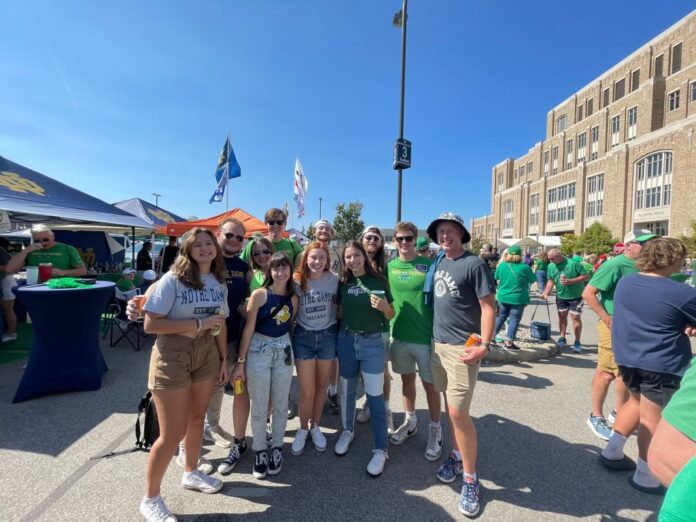On Friday, Oct. 13, Dr. Matthias Vorwerk, provost, sent an email out to all University of Dallas undergraduates, saying: “It has come to my attention that there appears to be a conflict between the University’s Tailgating on University Property Policy and the Student Handbook. While the University is reviewing the matter, the provisions of the Student Handbook will supersede the Tailgating Policy, in particular regarding the distribution and consumption of alcohol on campus.”
The University’s Tailgating on University Property Policy was signed on Oct. 16, 2018, by Dr. John Plotts, who was interim president at the time. The policy applies to all UD students, faculty, staff, alumni and members of the community using university property to tailgate.
The policy places specific limitations on the duration and nature of tailgating.
“Tailgating may begin no more than 2 hours prior to the scheduled start of the game and must conclude no more than 1 hour after the end of the game,” says the policy.
The crux of the tailgating policy is how it handles the consumption of alcohol on university property.
“Responsible consumption of alcohol is permitted while tailgating in accordance with alcoholic beverage laws of the State of Texas,” says the policy. “All beverages must be provided in single-serve aluminum cans. Kegs or other common source containers, drinking games, drinking game paraphernalia and glass containers are not permitted. Alcoholic beverages may not be removed from the designated tailgate area and are not permitted in any athletic facility or on any sideline.”
However, this is not in accordance with the 2023-2024 Student Handbook. Under the tailgating policy, alcoholic beverages can be brought to a tailgate so long as they meet the qualifications described and are only possessed and consumed by those over the age of 21. The current handbook only allows for the possession of alcohol bought from a university-sponsored vendor at the event.
Vorwerk quotes the following passage from the current Student Handbook in his email: “Violations against the Code include […] [p]ossession of open containers of alcohol in public spaces by students of any age, except those containers provided by sanctioned University services or officials.”
This has not always been the policy. Under the 2018-2019 Student Handbook, which was the current handbook at the time the tailgating policy was signed, the consumption of one’s own alcohol was not only allowed at University approved events, which would include tailgating under the disputed tailgating policy, but also in the Rathskeller.
“The consumption of alcoholic beverages and the possession of open containers, except at University-approved events,” said the handbook. “[A]re restricted to the Rathskeller and the residence hall rooms and student apartments of students of legal age, in which all residents of the room or apartment and guests are of legal drinking age.”
This is the same policy put forth in student handbooks up to at least the 2021-2022 Student Handbook. The Cor Chronicle was unable to acquire a copy of the 2022-2023 Student Handbook, so the exact semester this conflicting policy change was made is unknown.
“The policy simply clarified and put into the handbook what had already been longstanding understanding of the Code of Conduct on alcohol on campus,” said Dr. Gregory Roper, dean of students, under whose administration the change to the handbook was made. “The OSA staff noticed that it was not clearly in writing, so it was added.”
The three main parties deliberating on the matter are Ryan Reedy, chief of staff, Vorwerk, provost, and Roper.
“They’re the ones who are putting together a recommendation to submit to me,” said Jonathan Sanford, president.
Student Government has been a proponent of supporting athletic events at the university and has been in discussions with the administration on the matter. Sanford has confirmed their input is being taken into consideration.
“The Executive Council has been in conversations with the administration seeking guidance on how we can support athletics through the existing on-campus tailgating policy,” said Luke Posegate, senior economics major and president of Student Government. “We began discussions in August with hopes of getting huge crowds at soccer games.”
“We see tailgates as a great way to increase our cohesion with our athletes and upperclassmen,” said Xavier Piper, freshman business major and senator. “We greatly look forward to hearing the University’s decision and hope it can be delivered in the limited time left in this sports season.”
The student government’s motivations are in line with the university’s goal to boost their athletic program. “Whatever happens with the alcohol, I want to find ways to generate attention around athletics,” said Sanford.
In the absence of a football team, soccer is considered the prime UD sport to tailgate. The last home game of the men’s soccer season, which began on Friday, Sept. 1, is on Sunday, Oct. 29 at 2:30 p.m. against Colorado College. The women’s soccer season, which began on the same day, ends on Friday, Oct. 29 with a home game against Austin College at 5:00 p.m.

